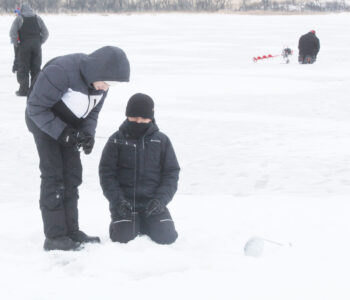‘The kids are number one’
MHS band director Wayne Ivers looks back on 38 years with the district

Photo by Deb Gau Wayne Ivers’ desk at Marshall High School is surrounded by photos and remembrances of Marshall band students. Ivers said getting to know the students, and seeing them grow as musicians and people, has been the best part of teaching at MHS.
MARSHALL — Wayne Ivers can remember the day he decided what he wanted to do in life. As a college student, he was invited to assist with a high school marching band practice.
“Right then I knew,” Ivers said. There wasn’t anything special about that particular practice — it was rainy, and the band was marching indoors — but he said it was a situation where “You just know inside of yourself, that this is your thing.”
And Ivers stuck with it, through a music education career spanning more than 40 years. He’s taught and directed band at Marshall High School for 38 of those years.
“It’s been fun to be here and to work here,” Ivers said. Getting to know and work with students has been a huge part of that, he said. “The kids are number one.”
Ivers is retiring this year. It’s going to be hard to say goodbye to MHS, Ivers said.
“Sometimes it just feels like it’s the end of the school year, not the end,” he said.
“Music has always been a huge part of what I do,” Ivers said. He enjoyed singing and music when he was growing up in Willmar, and participated in band in high school and college. The band director in his senior year of high school “really encouraged me to go into music,” he said.
Ivers taught in Clara City for six years before hearing about a job opening in Marshall from his former band director. He started teaching in Marshall in January 1983, he said.
The music program at MHS has reached a lot of milestones over the years, he said. One big change has been the way that the Marshall Tiger Marching Band has grown as a competitive marching band. When he started teaching, the marching band only performed at a few community events a year, and took part in one competition.
“It is a ton of work to only go out and perform one time,” Ivers said.
He said things started to change in the late 1980s when the Minnesota State High School League started inviting bands to perform at Prep Bowls. When MHS was selected, “For the kids, that was huge. It was just like winning the lottery,” he said. Over the ’90s and 2000s, the marching band would go on to perform in larger competitions, from the University of South Dakota’s high school marching band tournament to placing among the top of their class at Bands of America competitions. In 2012, MHS was the Class A champion in the BOA St. Louis Super Regional Championship.
However, Ivers said his most important goal for students isn’t performance skill or competitive success.
“I don’t expect everyone to become a professional musician. I do expect them to be good people,” he said. “I think it’s important we all respect each other for our involvement” in school activities, he said. Without respect, cooperation and discipline, the band wouldn’t work.
Over the years, it’s been rewarding to see the way students grow, Ivers said. Examples include seeing ninth-graders step up to the increased expectations of high school band, students making big improvements in their skill, or marching band members succeeding with a piece of music they thought was “way too hard,” he said.
“It’s tough when they graduate,” he said of saying goodbye to students.
There were a lot of memorable moments in competing in marching band, he said — but they didn’t necessarily have to do with winning. For students, the best memories could be the time with classmates, or the fun they had doing the show.
“Win or lose, I want them to have a sense of accomplishment when they’re done,” he said.
“It’s going to be different,” Ivers said of retiring. It was hard telling students his decision, but he said he thought it was time.
“I don’t think I’m ready, but it’s time to be done,” he said.



